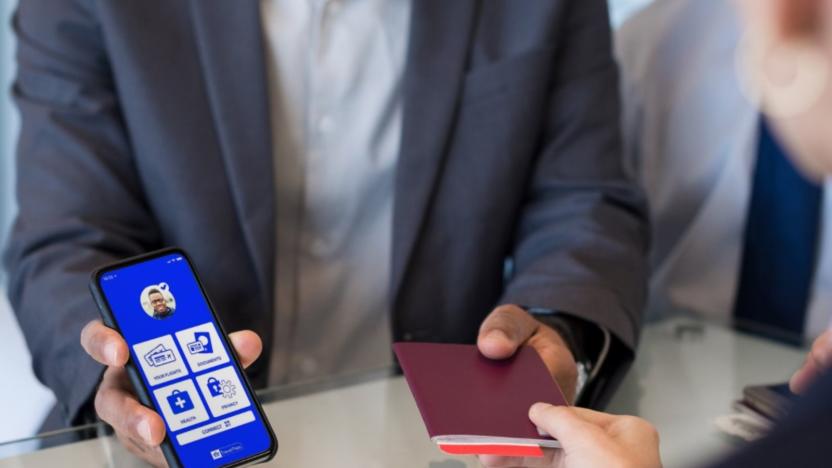IATA
Latest

The airline industry will release a COVID-19 passport for your iPhone next month
The software allows airline travelers to store verified COVID-19 test results and vaccination certificates on their phones.

AOptix e-Gate could improve global airport security, replace ID checks with iris scans
You're certainly not alone if you think that the current airport security process is far from ideal. AOptix hopes to streamline and speed up security procedures by replacing manual boarding pass and ID checks with a biometric kiosk called e-Gate. The new system, which verifies passenger identities by matching an iris scan with a boarding pass, just received (IATA) approval, and is currently being tested in three airports around the world. It's not as slick as a similar concept we saw earlier this summer, but e-Gate could be implemented with a trusted traveler program, creating special lanes for pre-approved frequent fliers -- similar to the US Customs Global Entry system in place today. We don't see it replacing X-ray machines and check-in interviews, but it could remove human error from the equation -- at least when it comes to verifying your identity. Jump past the break for the full scoop from AOptix, or you can check out the system for yourself at the Future Travel Experience in Vancouver. Update: e-Gate is in fact a potential component of Checkpoint of the Future, which we saw conceptualized in June.%Gallery-133007%

IATA's Checkpoint of the Future uses biometric IDs to separate do-gooders from terrorists (video)
This, ladies and gentlemen, could be your Checkpoint of the Future -- a new airport security prototype that promises to move away "from a system that looks for bad objects, to one that can find bad people." Unveiled at the IATA's annual conference in Singapore yesterday, the setup is comprised of three, 20-foot long detectors -- one for "known travelers," one for high-risk flyers, and one for everyone else. Instead of funneling passengers through the same checkpoint, then, the prototype would use eye scanners and biometric chips to verify their identities and analyze their personal history, before dividing them into groups. People who complete and pass government background checks would waltz through the fast pass lane with their carry-on luggage in tow, whereas those deemed particularly risky would have to undergo a more intensive, full-body scan within the "Enhanced" security lane. The rest of us, meanwhile, would be directed to the "Normal" detector, which would automatically scan us for liquids, metals and everything that is evil. The IATA says this risk-based approach would reduce security lines and lower airport costs, but it would still require governments to share data on their own citizens, which could pose a major hurdle to widespread adoption. For now, the IATA and governmental agencies are still hammering away at the details and have yet to announce a pilot program, but you can check out an audio-less demo video of the prototype, after the break.

Airlines announce bar code standard for cellphone check-ins
It looks like the International Air Transport Association has managed to get the various airlines it represents to hop on the cellphone-as-ticket bandwagon in a big way, although it appears that widespread adoption of the technology is still quite a ways off. Unlike some other systems, this new standard consists of a bar code that passengers receive as a text message, which can then be read directly from the phone's screen when they arrive at the airport. The standard, which the IATA hopes will take hold by 2010, even goes so far as to incorporate various bar code systems in use around the world, including Aztec, Datamatrix, and the ever-popular QR codes. Of course, it's more than just convenience that convinced the airlines to sign on, with the IATA estimating that change could ultimately end up saving the airlines more than $500 million a year.[Thanks, Laura. Photo courtesy of Adam Berry/Bloomberg News]



